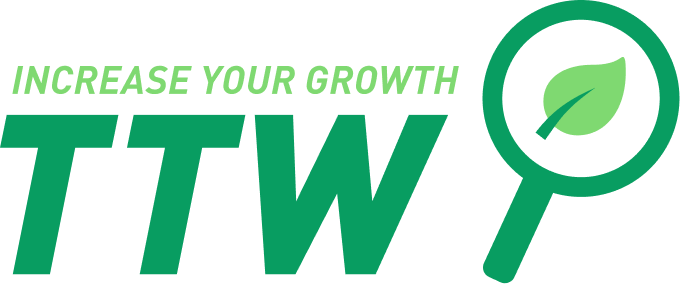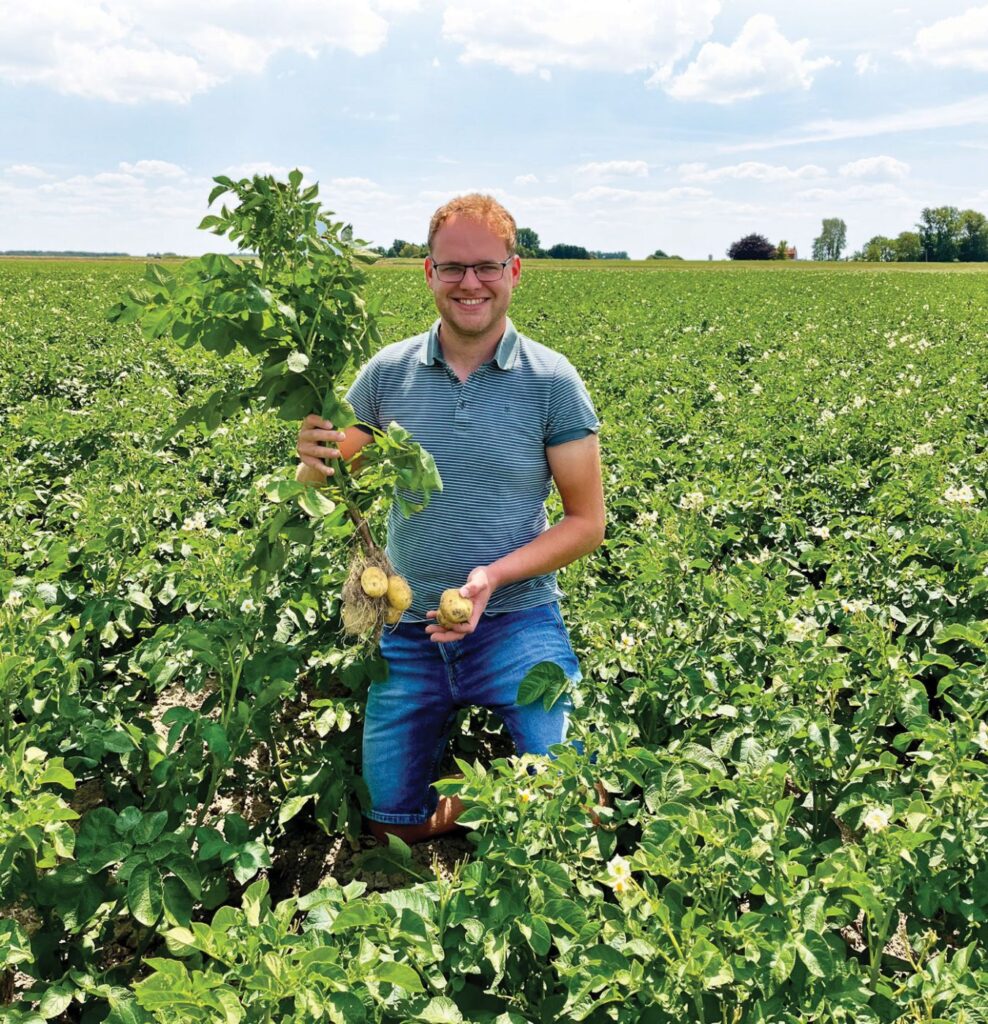How do young growers and advisers view the future of arable farming? How do they expect the sector to develop in the next few years and look forward to it ten years from now? Akker van het Noorden discussed it with two young growers and three of their advisers.
Nicolas Buijck (25) is co-owner of the family farm in Sint Philipsland where, on a farm of 80 hectares, the cropping plan consists of growing potatoes, beets, wheat, grass seeds and vegetable seeds. 'If you ask me what arable farming will look like in about 10 years, I think a lot depends on political decisions and therefore laws and regulations,' Buijck says. 'At the same time, of course, every grower has his own responsibility to anticipate this as well as possible. I think one way to shape that is to make much greater use of mechanical weed control. We already work quite a lot with soil scans ourselves and I expect this to expand with us as well. With that, you can better steer what the plant really needs.'
Grower becomes 'doctor'
Buijck hopes that commitment to what the plant really needs will actually pay off in the future. 'I myself have done a lot of research into trace elements in our soils and crops. This showed, among other things, that the zinc content in our potatoes was too low. So, out of curiosity, I tested my own blood and guess what: also too low. We now add more zinc to the potatoes to improve the levels. I feel responsible to manage this, but you don't really get paid extra for such efforts. While this can really help to reduce healthcare costs and in this way we as growers really make a social contribution. We are much more the doctor of the future, I would like to see that. To be honest, this may be more hope than I really think it is realistic, but it is a nice aspiration for me.
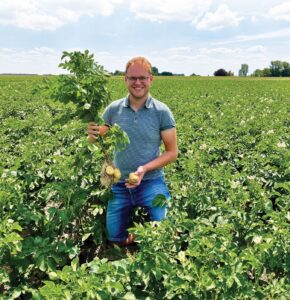
Nicolas Buijck: 'If our products help reduce healthcare costs, we growers contribute even more.'
Buijck goes on to say that he is not being negative and wants to come across that way, but that he sees it happening that crops are disappearing from the Netherlands as pesticide use is rapidly being restricted. 'The problem I have with that is that the products are still being sourced just as much from abroad and sold here, while the rules are less strict elsewhere.
'I want to use soil scans to better manage what the plant needs'
I sometimes get excited about such things. I myself often said earlier that I wanted to grow seed onions, but the possibilities are now so limited due to fewer permitted substances that I no longer dare to do so. We also stopped growing chicory earlier for the same reason.' The young farmer does not mind criticism from society, but says he feels that many people from outside agriculture do not have a realistic picture of farming. 'My hope is that chain parties will support us more and better in the coming years to interpret and defend our position.'
'Emotion rules too often'
His colleague Ruben Ippel (22) from Werkendam shares this view: 'If, for example, it's about us being allowed to use less chemistry, I honestly still get wind of it sometimes. That's because, in my view, a lot is often shouted by people who know little about it. Many citizens repeat them and we are left scratching our heads, even though it is by no means always proven that something is harmful. If it is, I am not against a ban, but too often emotion rules.'
Ippel grew up on an arable farm, but is now part of the company Q Akkerbouw where he joined a vof since the beginning of this year. Both farms are located in the Brabant Biesbosch. The downside is that there are Natura2000 areas nearby and that may well cause some restrictions in the coming years. An advantage is that we actually never have a water shortage here and are therefore less likely to have irrigation bans. The farms that remain will probably continue to grow in size and I expect that we will partly focus on that, but scaling up is not my first and most important goal. I would like to do everything right and therefore be able to give full attention. That is more important to me than growth.'
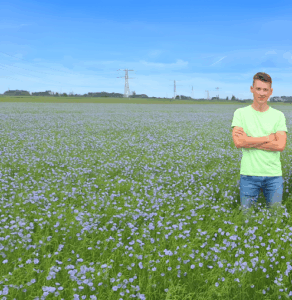
The Q Arable farm has a diverse crop plan with ware potatoes, some home-grown seed potatoes, sugar beet, wheat, flax and green beans. 'On the parent farm, which is nearby, we grow slightly more rest crops. In recent years, we have gone the extra mile there with commitment to better soil management. That is also where I want to do more at Q Akkerbouw in the coming years.
'For me, doing everything right around cultivation is more important than growth'
bet on it. Because I 100% believe that soil health is the most important key and for future-proof cultivation. If only for the fact that we are allowed to use less chemistry, so we need to make our own soils even more resilient. One way we do that is by using more solid manure, which is better for the soil and it also pays off in the medium term because we need to use less fertiliser and so the soil becomes healthier. It's also tricky sometimes because having slurry supplied is more profitable in the short term.'
Technological progress
The young grower has no doubt that technology in various forms will also gain a greater foothold. 'Controlling weeds mechanically or naturally is not always easy yet, but we are surely moving more towards it. A lot is already possible now. For example, we bought a universal spreader to apply site-specific organic manure, compost and, for example, gypsum. I see a future in that. We also plant the potatoes and sow the beets with GPS and variable distance task maps. Further expansion in these techniques is bound to happen in the coming years.' For sales, Ippel sees local sales through short chains growing further in the coming years. 'I personally see some benefit in that. At home, we already sell fries from our own potatoes. It's nice to be more involved with your own product and often yields better margins. Opportunities like these make me look very positively at the future of arable farming; it is enjoyable to produce food for people close by and all over the world.'
'Idealism and realism are far apart' Shirley Hekkert (26) Works as operations manager at TTW; has no agricultural background but took courses up to HBO that (partly) focused on the agricultural sector and found her career in this sector via that route.
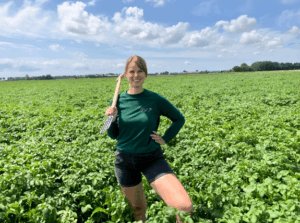
The entire agricultural sector has to deal with being under a social magnifying glass. So there is quite a big gap between how citizens and farmers experience agriculture. At least that is the picture I get from friends and acquaintances outside agriculture. They denounce intensification and economies of scale, but at the same time want safe and above all cheap food. In my view, idealism and economic realism often run far apart. At the same time, they are our customers and most of them live in urban areas. Therefore, you have to take their ideas and wishes seriously. It is also because of the wishes of most citizens, who want to see further sustainability in agriculture, why I expect sustainability to continue.
Dutch citizens are, in a direct or indirect sense, growers' most important customers so growers have to go along with that. Today, in that context, you hear and read a lot about the commitment to regenerative cultivation. That term does need to be given substance. I think we all want the same thing and that is to make an impact. If growers manage to maintain quality and yield with less fertiliser and pesticide use, they are making an impact. That is worth more than a fancy term or whatever label. You can expect growers to dare to deviate from their routines in order to stay future-proof. By daring to rely more on data, they can do so. At the same time, my hope is that other chain parties will also contribute something by placing the risks less on the grower's shoulders. I am thinking for instance of potato trading houses. Today, they often deliver potatoes to growers without any information. In my opinion, that really has to change. With much more openness, growers can treat the plants in a much more targeted and efficient way and also better explain all the actions and treatment around cultivation to customers and citizens.'
'Automation helps us towards more sustainable cultivation methods' Lotte Mijs (19) Is a 1st year student at HAS, specialising in business administration & agribusiness and is doing an internship at TTW. Lotte grew up in Ooltgensplaat on Goeree-Overflakkee on her parents' arable farm.

'I expect social pressure to produce more sustainably to increase in the coming years. With automation and robotisation, growers will probably also be able to produce more sustainably and efficiently. By more efficient, I mean that you administer resources only where they are needed and only when they are really needed. The fact that citizens ask for more sustainable cultivation methods is also quite logical and fine in my opinion. Only, I have the idea that many citizens' knowledge is very incomplete and mainly shaped by images on social media. Often things are misinterpreted and it is also quite often sensitive. I therefore also watch my words in discussions with people outside agriculture. By that, I certainly don't mean that we shouldn't keep talking to citizens and listening to their wishes. Even though that is sometimes difficult, especially if the image surrounding agriculture is once again negative.
These days, I hear all kinds of things about it having to be regenerative, but it is not clear what that means. That this definition is not clear is, on the one hand, not a bad thing: it allows you to fill it in with nice flexibility. But on the other hand, it is difficult, because we don't know what to aim for and what actually changes when we say: we are going to grow regeneratively. While we don't have a clear idea of what that should entail. Personally, I find the developments around short chains interesting. I expect that to grow in arable farming and I also see opportunities in that, perhaps on our own arable farm at home where I hope to become active after my education. Working in short chains ensures more direct contact and, I think, therefore more understanding. The future is challenging, but with automation, robotisation and data-driven growing, a lot is possible. Whether it's called regenerative or not, it will have to be more sustainable. And it will succeed.'
'The future demands more proactive and preventive work' Ben van Paassen (24) Works as a crop consultant for TTW with a specialisation in chicory cultivation. Studied in Delft and grew up on a dairy farm near Pijnacker.
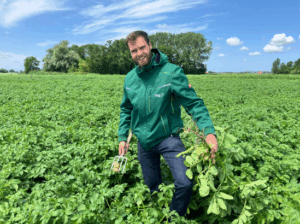
'It is always very difficult to look into the future, but the path towards more robotisation and digitalisation has already started and I expect that to continue clearly in the coming years. For me as a crop consultant, that also means that I have to follow those developments closely; that is a requirement for consultants in the future, that you keep up and know how modern technology can be utilised. Social and political pressures may well put strong pressure on certain crops in the Netherlands. I understand that some growers perceive this as threatening, especially with increasing laws and regulations. Yet I believe that precisely in such difficulties lie opportunities. As the challenges become greater, specialism often increases - and with it potential economic value.
A good example is chicory growing, in which I myself am active: a fairly specialised crop that is not suitable or attractive for every grower. Whether you can and want to call it regenerative may not matter very much, but I think growers do want and need to work on resilient soils and resilient cultivation methods. That also increases the chances of facing the threat of less chemical use. I think this does require a different mindset and working more preventively and proactively. Of course, this is sometimes easier said than done, but I still think: you can dwell every day on everything that becomes or feels more difficult, but that contributes little. I think it is important for growers now, but certainly in the future, to spar with others in the sector. Share early challenges and opportunities towards the next season. That can be an advisor, but it can also be fine with colleagues. There is no denying that there are big challenges ahead, but I am mainly curious and maintain my positive base also in terms of future opportunities for arable farming in the Netherlands.'
Link to the article: https://www.akkervanhetnoorden.nl/bodem/hopen-dat-meerwaarde-leveren-in-de-toekomst-loont/
